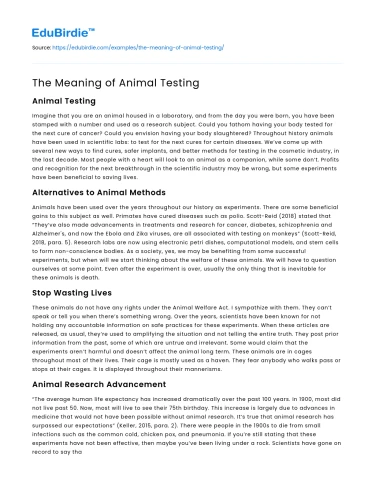Animal Testing
Imagine that you are an animal housed in a laboratory, and from the day you were born, you have been stamped with a number and used as a research subject. Could you fathom having your body tested for the next cure of cancer? Could you envision having your body slaughtered? Throughout history animals have been used in scientific labs: to test for the next cures for certain diseases. We’ve come up with several new ways to find cures, safer implants, and better methods for testing in the cosmetic industry, in the last decade. Most people with a heart will look to an animal as a companion, while some don’t. Profits and recognition for the next breakthrough in the scientific industry may be wrong, but some experiments have been beneficial to saving lives.
Alternatives to Animal Methods
Animals have been used over the years throughout our history as experiments. There are some beneficial gains to this subject as well. Primates have cured diseases such as polio. Scott-Reid (2018) stated that “They’ve also made advancements in treatments and research for cancer, diabetes, schizophrenia and Alzheimer's, and now the Ebola and Zika viruses, are all associated with testing on monkeys” (Scott-Reid, 2018, para. 5). Research labs are now using electronic petri dishes, computational models, and stem cells to form non-conscience bodies. As a society, yes, we may be benefiting from some successful experiments, but when will we start thinking about the welfare of these animals. We will have to question ourselves at some point. Even after the experiment is over, usually the only thing that is inevitable for these animals is death.
Stop Wasting Lives
These animals do not have any rights under the Animal Welfare Act. I sympathize with them. They can’t speak or tell you when there’s something wrong. Over the years, scientists have been known for not holding any accountable information on safe practices for these experiments. When these articles are released, as usual, they’re used to amplifying the situation and not telling the entire truth. They post prior information from the past, some of which are untrue and irrelevant. Some would claim that the experiments aren’t harmful and doesn’t affect the animal long term. These animals are in cages throughout most of their lives. Their cage is mostly used as a haven. They fear anybody who walks pass or stops at their cages. It is displayed throughout their mannerisms.
Animal Research Advancement
“The average human life expectancy has increased dramatically over the past 100 years. In 1900, most did not live past 50. Now, most will live to see their 75th birthday. This increase is largely due to advances in medicine that would not have been possible without animal research. It’s true that animal research has surpassed our expectations” (Keller, 2015, para. 2). There were people in the 1900s to die from small infections such as the common cold, chicken pox, and pneumonia. If you’re still stating that these experiments have not been effective, then maybe you’ve been living under a rock. Scientists have gone on record to say that they do not treat the animals inhumane. They’ve cracked down on the numbers of animals that they’ve used over the years. They perform alternative methods. They use other models and methods that they can perform these test on besides animals.
Conclusion
Believe it or not, scientists have some of the toughest jobs. They’re making sacrifices daily, to save people. You have to ask yourself, if your child was dying of one of those diseases and there wasn't a cure, then would it be okay? Would you choose an animal over a loved one to undergo an experiment to find a cure? It takes dedication and sacrifice to do this job. There are many black and white areas in life, and some things in life come with a price. If you think otherwise, then you’ve truly been misinformed.
References
- Scott-Reid, J. (2018, November 20). Lab monkeys deserve retirement – not death. Globe & Mail. Retrieved from http://libproxy.ecpi.edu:2084/ps/retrieve.do?tabID=FeaturedContent&resultListType=RESULT_LIST&searchResultsType=SingleTab&searchType=TopicSearchForm¤tPosition=1&docId=GALE%7CA562765013&docType=Article&sort=Relevance&contentSegment=ZXAY-MOD1&prodId=OVIC&contentSet=GALE%7CA562765013&topicId=00000000LVV7&searchId=&userGroupName=lirn55593&inPS=true#
- Keller, R. R. (2015, November 25). Scientific Research on Animals Is Vital to Advance in Medicine. In S. Engdahl (Ed.), Opposing Viewpoints. Scientific Research. Farmington Hills, MI: Greenhaven Press. (Reprinted from How Does Animal Research Advance Medicine?, lions-talk-science.org, 2013, November 25) Retrieved from http://libproxy.ecpi.edu:2374/apps/doc/EJ3010948222/OVIC?u=lirn55593&sid=OVIC&xid=263cc1ff






 Stuck on your essay?
Stuck on your essay?

